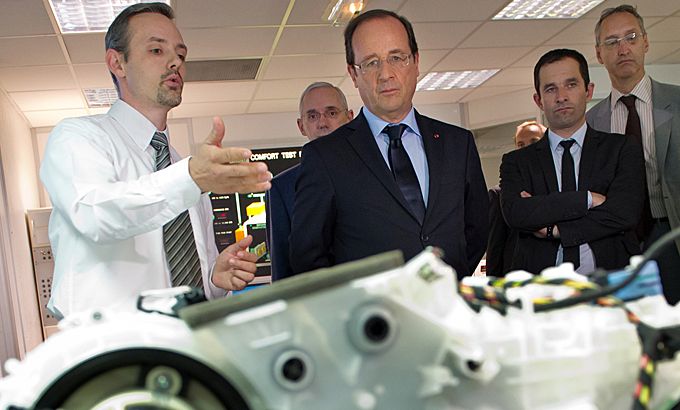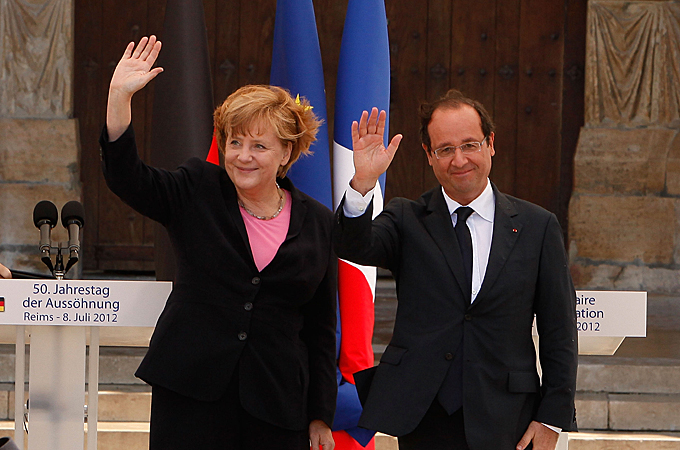Hollande treads Europe’s economic minefield
Socialists must implement dramatic reforms if France is to salvage economic and political influence, economists say.

With France on the verge of recession, François Hollande, France’s Socialist president, is going to have scarce resources to deliver on his campaign promise of growth promotion.
France posted zero growth in the first quarter of 2012. The Bank of France has forecast a contraction of 0.1 per cent of its gross domestic product for the second and third quarters, meaning the country would be in a recession for the first time since 2009.
Keep reading
list of 4 itemsInside the pressures facing Quebec’s billion-dollar maple syrup industry
‘Accepted in both [worlds]’: Indonesia’s Chinese Muslims prepare for Eid
Photos: Mexico, US, Canada mesmerised by rare total solar eclipse
In the grand scheme of things, France is doing better than most of its fellow European nations. On July 30, ratings agency Standard and Poor’s predicted an average contraction this year of 0.6 per cent across the eurozone.
Several southern European economies are already deep in recession, and Spain is reportedly expected to become the next state to seek a bailout.
With its sluggish start to 2012, however, France is struggling to keep up with its main European ally and competitor, Germany. Europe’s largest economy has also begun to experience a decline in growth and business confidence, but is proving more resilient than France.
With France’s position as a leading economy seemingly threatened as never before, the country’s new Socialist president appears to be facing incredible pressure to become the man who reforms reform-resistant France.
 |
| Friends or foes? Hollande, right, agrees with Merkel on the importance of reigning in national deficit, but their differing strategies are a source of contention [EPA] |
If Hollande fails to conserve France’s relative economic might, it could see its regional clout ebb, as German officials push for a more centralised European Union in return for bankrolling weaker states.
The new president is less than three months into his term, and the latest economic developments are due to the grim climate pervading across the eurozone rather than his own policies, most economists agree.
Michel Didier, a member of the Council of Economic Analysis which advises the prime minister on economic policy, said worries over the eurozone had pushed domestic consumption and investment down.
“The economic situation has worsened, but this isn’t really linked to Hollande’s policies,” Didier said.
The economist told Al Jazeera that Hollande’s government risked accelerating this economic and political decline if it failed to enhance the competitiveness of French business.
“Hollande wants to raise taxes, without cutting public spending,” Didier said. “This is the worst possible strategy for economic growth.”
In terms of the Socialist’s overriding aim – to reduce the public deficit – Didier said the president was keeping in line with the strategy pursued by his conservative predecessor, Nicolas Sarkozy.
“Hollande’s rhetoric is against austerity, but in practice this is exactly what he’s doing,” said Didier.
The real difference between Hollande’s strategy, and with that favoured by both Sarkozy and Germany’s Angela Merkel, lies in the intention to reduce the deficit through tax hikes.
With public money available to help companies struggling to stay afloat, Didier said, the best assistance the government can offer is to lower payroll taxes. This would allow French companies to better compete in the global economy, he added.
“There is a serious problem, because the strategy to lower payroll taxes and to lower the price of production, which was adopted [during Sarkozy’s presidency] to help improve competitiveness has been rejected by the new government,” he said.
Reindustrialisation?
One of Hollande’s key campaign promises was to create jobs by stimulating reindustrialisation. This is looking harder than ever to live up to amid economic recession.
By June, unemployment had hit a 13-year high of ten per cent. Worryingly, the young are struggling to even enter the workforce at all. Some 23 per cent of people under the age of 25 (not including students) are now unemployed, according to the European Parliament’s Eurostat service [PDF].
| Economic bright spots |
|
Not all French companies are in distress, particularly those that export beyond the eurozone. The prestigious Richemont Group announced in August that it had experienced a 24 per cent increase in sales for the previous four months. Likewise, luxury giant LVMH saw a 26 per cent jump in sales for the first semester. France is courting investment and strategic markets in the oil-rich Gulf states. In 2012, exports to some Gulf states are predicted to increase. |
France has shed 750,000 manufacturing jobs over the course of the past decade, as Arnaud Montebourg, the minister of productive recovery, recently reminded the French.
“Private solutions, public solutions, alliances between the private and public [sectors], it’s on a case-by-case basis that we will repair the economy,” he declared during his first speech as minister in May.
Yet as early as April, French unions warned that some of France’s biggest employers had put plans to downsize on hold during the presidential campaign, and that tens of thousands of jobs were on the line in the coming months.
France’s economic problems have been in the making for the past 20 years, a French economist who preferred not to be named told Al Jazeera, and are rooted in its struggles to find a viable economic model in a globalised world.
The amassing of wealth during the years of the country’s extensive imperial adventures has continued to subsidise public services well into the post-colonial era, he said, but the money is running out.
“France has historically accumulated its wealth through its colonial empire, which is why it is still such a rich country today, because this wealth was gathered over a very long time,” he said.
“We are not in a desperate situation, but we are in a situation where the necessary measures will be unpopular.”
Serious structural reforms must be introduced, he said, adding that this does not necessarily mean following the Anglo-Saxon model of slashing the public sector.
Struggling to compete
The auto industry is already showing the strain and is, economists say, a case in point.
In July, PSA Peugeot Citroën announced plans to lay off 8,000 workers and close a factory in Seine-Saint-Denis, the department north of Paris that already has the highest unemployment rate in the country.
Car sales in France were down by 16 per cent in July 2012 compared with the previous year. With sales plunging across the continent, car manufacturers have excess stock, further pushing down prices.
The eurozone crisis has pushed down demand for cars – not only in France but also across Europe. The PSA group reportedly lost $250m a month throughout 2011.
South Korean automakers Kia and Hyundai, in contrast, have enjoyed an increase in sales in the first two months of the year.
|
“We are not in a desperate situation, but we are in a situation where the necessary measures will be unpopular.“ – French economist |
France has asked the European Commission to begin monitoring car imports from South Korea, a step that might lead towards a re-introduction of tariffs.
Hollande’s government has also introduced bonuses for buyers of zero-emission electric vehicles or hybrid cars, to help auto companies that have invested in developing them. Even with these incentives, however, most low-emission vehicles remain out of the price range of the average consumer.
Peugeot Citroën has reportedly said that it did not want any government aid, but for a “massive” reduction in the cost of labour.
“We can create all the bonuses we want, it won’t have any impact on the production costs,” Didier said.
Reform inevitable?
Christian Malard, a political correspondent at France 3 television, said that Hollande had made too many promises on the campaign trail that he would not be able to keep.
Hollande’s policies were “outdated,” he argued, and reflected a misguided nostalgia for the 1980s under the last Socialist president, François Mitterrand.
“They don’t have concrete steps, they don’t have imagination,” said Malard.
He was also critical of the division between Hollande and Merkel.
“The future of Europe, and of the eurozone, lies in a strong Franco-German axis,” he said.
Any perception that he is too close to Merkel, however, would be politically dangerous. Much of the French population are highly sceptical of EU leadership and have traditionally resisted moves to surrender French sovereignty.
One such sign of the increasingly polarised nationalism and the fear surrounding the potential for ceding power to Europe was the historic result scored by far-right candidate Marine Le Pen in the first round of the presidential election in April.
The far-left candidate, Jean-Luc Mélenchon, meanwhile, scored the highest number of votes for a far-left candidate since the early 1980s.
His movement did not seek any cabinet posts in Hollande’s government, and is prepared to spearhead street protests against the Socialists if they pursue major cutbacks.
“We are ready to take to the streets, and to organise whatever battle needs to be organised against austerity plans,” Raquel Garrido, the Left Party’s international spokesperson, told Al Jazeera.
“Papandreou [the former Greek prime minister] failed, Zapatero [the former Spanish leader] failed, when Hollande goes there he will fail and we’ll be ready to govern,” she said, referring to other Social Democratic leaders who lost public support after introducing unpopular austerity measures.
Whatever path he chooses, Hollande’s presidency risks becoming a minefield.
You can follow Yasmine Ryan on Twitter: @yasmineryan